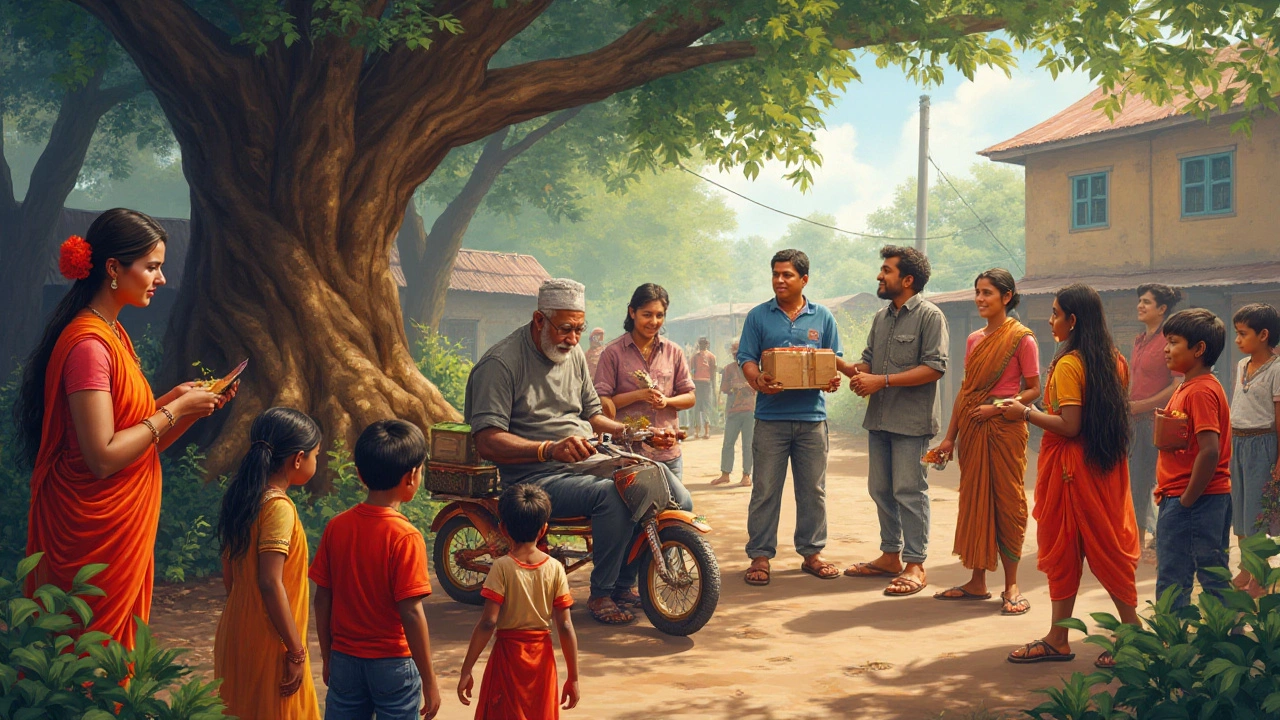The Essential 3 Ts of Volunteering for a Rewarding Experience
 Feb, 1 2025
Feb, 1 2025
Volunteering is more than just a simple act of service; it's a meaningful contribution that can transform both the volunteer and the community. There's a guiding framework that helps make sense of this noble endeavor—the 3 Ts. This concept emphasizes the importance of Time, Talent, and Treasure, showing how each element plays a crucial role in volunteering.
In today's world, where needs are diverse and solutions often intricate, understanding how to leverage the 3 Ts can significantly enhance your volunteering experience. Whether it's spending an afternoon at a local shelter, utilizing your unique skills to support a cause, or donating resources, each action has its significant value. The essence of volunteering lies in being part of something greater, creating ripples of change that go beyond individual efforts.
Let's explore how these three fundamental elements can help foster a more impactful and rewarding volunteer journey. By aligning your available time, skills, and resources, with the needs of the community, you can create meaningful connections and lasting changes. Volunteering is not only about giving but also about learning, growing, and engaging with the world in a deeper way.
- Understanding the 3 Ts
- The Value of Time in Volunteering
- Harnessing Talent for Community Benefit
- Giving Treasure: Beyond Monetary Donations
- Creating a Holistic Volunteering Experience
Understanding the 3 Ts
The concept of the 3 Ts in volunteering—Time, Talent, and Treasure—serves as a comprehensive framework for individuals seeking to make meaningful contributions to their communities. Each aspect is distinct yet interconnected, offering different gateways through which individuals can effectively participate and influence positive changes. At its core, this model recognizes that no matter the resources one may possess, there is always a way to give back, and in doing so, experience personal and communal growth.
Time is perhaps the most democratic resource; it's something we all possess equally in terms of hours in a day, but its availability varies based on our commitments. Choosing to allocate time toward community service is a powerful act that can manifest in various forms, from mentoring youth to organizing charity events. The impact of dedicating time often extends beyond immediate outcomes—it's about creating lasting relationships and fostering a culture of empathy. Spend an hour reading to the elderly or helping a child learn to read, and you'll realize that these moments are woven into the fabric of change.
"Volunteers do not necessarily have the time; they just have the heart." — Elizabeth Andrew
Moving onto talent, imagine the range of skills within a single community. Talents aren't limited to those with specialized skills; whether you're a master chef or simply good at organizing, there's a niche for you in the world of volunteering. From musicians offering free lessons to IT professionals setting up networks for non-profits, the potential to use one's unique skills is infinite. Recognizing and deploying your talents to fit the needs of your community can amplify your impact, ensuring that the help you provide is both effective and sustainable. Many non-profits thrive on the diverse skill sets of their volunteers, leading to more innovative solutions and outcomes.
The third T, treasure, encompasses material donations and financial support. It's not just about sizable amounts; it includes any thoughtful contribution that can enhance the capability of an organization in achieving its mission. Whether it's donating books to a local library or providing supplies for a school program, these contributions hold the power to bridge gaps and offer opportunities. For individuals unable to commit time or talent, treasure offers a crucial way to support those who can.
Understanding the 3 Ts presents a versatile model of volunteering, urging individuals to assess their situations and resources. It redefines what it means to give back, making the act of volunteering accessible to all. By weaving these three threads together, we not only strengthen communities but also create a more inclusive space for everyone to contribute according to their capacity. Reflecting on these aspects can help guide one’s choices and commitments in community service, ensuring that every volunteer action is equally valuable and appreciated.
The Value of Time in Volunteering
Time is one of the most precious resources we have, and dedicating time to volunteer work can significantly impact both the individual and the community. It’s about more than just the hours spent working; volunteering requires a commitment that often involves changing schedules and prioritizing community needs, sometimes over personal obligations. When you give your time, you’re not just helping others; you're also becoming part of a movement towards positive change. Studies have shown that people who give time to causes they care about experience lower stress levels and higher satisfaction in life.
As Winston Churchill once said, "We make a living by what we get, but we make a life by what we give." This highlights the intrinsic value of volunteering your time.Volunteering isn't about lengthy shifts or feeling overwhelmed by responsibility; it is about meaningful interactions and small, genuine connections that add up to create substantial societal change.
In practical terms, the value of time spent volunteering also manifests in building skills and expanding networks. Volunteering offers a unique platform where one can develop or improve skills applicable in the workplace. Whether it's organization, communication, leadership, or even technical skills like web design, volunteering can act as a training ground without the pressures of formal employment. This time spent learning and honing skills also opens doors to new career opportunities and professional networks that might otherwise remain elusive.
Moreover, the consistency of volunteering one's time is a cornerstone for building trust and dependability within the community. A routine schedule, like weekly visits to a food bank or mentoring youth, not only aids in the efficient running of organizations but also establishes a support system among volunteers and beneficiaries. By being a reliable volunteer, one helps ensure continuity and stability in services that many communities rely on. It's not just about showing up; it’s about being there when needed and forming a relationship grounded in commitment and shared goals.
Many organizations have quantified the value of volunteer time, providing insights into its economic impact. According to Independent Sector, the 2023 estimated national value of volunteer time was pegged at approximately $31.80 per hour. This figure highlights not only the significant economic value volunteers contribute to non-profits and communities but also reiterates the importance of structured volunteer programs. Recognizing the economic worth of volunteer hours can help in advocating for more robust support systems and funding for volunteer initiatives.
Ultimately, the value of donating one's time goes beyond monetary assessments. It's about fostering human connections, empathy, and understanding of diverse perspectives. These experiences teach us about resilience and the power of collective efforts, broadening our worldview and encouraging a mindset of continuous learning and generosity. Investing time in causes we're passionate about doesn't just enrich the lives of others; it profoundly enriches our own, creating a cycle of giving that continually nourishes the heart and spirits of all involved.

Harnessing Talent for Community Benefit
Unlocking the potential of your unique skills and abilities can create ripples of change that have a significant impact on your community. When you think about what it means to volunteer, it’s not just about giving what you have at the moment. Instead, it’s about leveraging your talent in ways that make the most sense and create substantial differences. From skilled artisans offering creative workshops for underserved populations to IT professionals setting up free tech support days for nonprofits, the opportunities to apply talent are both varied and rich. Imagine the benefits of a lawyer who offers pro bono services to individuals in need or a financial expert who helps a charity optimize its resources for better outcomes. These are just a few examples of how one's professional skills can be translated into meaningful community work.
"The best way to find yourself is to lose yourself in the service of others." — Mahatma Gandhi
Talent-based volunteering is about more than just the domain expertise; it engages the volunteer on another level, providing them with a sense of purpose and channeling passions into productive endeavors. In a study conducted by the Corporation for National & Community Service, it was found that volunteers are almost twice as likely to do well in their careers, attributing success to the confidence and new skills gained from volunteering. It's fascinating how intertwining volunteering with talent can meet community needs while also fulfilling personal growth.
Steps to Identify Your Volunteer Potential
Before setting out, it’s worthwhile to conduct a talent inventory. Are you a brilliant chef? Consider teaching cooking classes at a local community center. Enjoy writing? Nonprofits are often in need of grant writers. Start by listing out skills that you excel in, coupled with those you are passionate about. Then, consider local needs and brainstorm how your skills could address these challenges.
- List skills: Write down key skills you possess, including technical skills, soft skills, and even hobbies.
- Match skills with needs: Identify local organizations or causes that might benefit from your unique abilities.
- Reach out: Contact these organizations and offer your services. Clear communication is key here, so be sure to express enthusiasm and the specific ways you can contribute.
- Commitment: Determine the time you can dedicate. Effective volunteering is also about consistent contribution.
In crafting a partnership with these organizations, it's always fulfilling to see how your talents could spark significant advancements. When communities and volunteers come together, various challenges become far more surmountable, the sense of connection deepens, and impactful solutions arise from once-unnoticed capabilities.
Giving Treasure: Beyond Monetary Donations
When we speak of donating treasure in the context of volunteering, most minds drift towards the image of individuals writing checks. While monetary gifts are indeed valuable, the concept of treasure extends far beyond, encompassing a wider spectrum of giving. At its heart, treasure involves sharing resources that one holds dear or has in abundance to support a particular cause. This can include everything from physical items to intangible assets like expertise or knowledge. For instance, donating household goods, clothing, or even technical equipment can dramatically enhance the operations of non-profit organizations, enabling them to redirect financial resources to other pressing needs.
One area often overlooked is the donation of professional skills or services. Say you're a talented graphic designer or a savvy accountant; offering your expertise to a non-profit not only helps to build capacity but also drives its mission forward efficiently. This form of treasure—skill-based volunteering—adds an invaluable layer to the realm of community service. Many non-profits operate with limited staffing and budgets, hence gifts of skills can significantly impact their ability to serve communities effectively. Moreover, collaboration with skilled volunteers facilitates innovation and often inspires grassroots solutions.
Providing treasure can also mean access to spaces or networks. Organizations may have brilliant ideas but lack a venue; offering your conference room or even a vast backyard for events can bridge that gap. Similarly, extending your professional network, connecting non-profits to potential partners, donors, or other vital stakeholders, often proves invaluable. This kind of treasure emphasizes that even a seemingly small gesture can ripple out to create broad, lasting impacts. Bill Gates once observed,
“We make a living by what we get. We make a life by what we give.”This captures the essence of giving treasure in its most holistic form.
Physical labor often qualifies as a treasure that's underestimated. Imagine you're part of a gardening club; your combined efforts to set up a community garden can feed many and educate others about sustainable agriculture. Such communal endeavors showcase a type of treasure that binds people, fosters solidarity, and plants seeds for a thriving future. It is this aspect of treasure—one not confined by financial limitations—that embodies the spirit of community service at its best.
Lastly, consider the treasure of shared experiences. Sharing stories and testimonials of how one has benefited or learned through volunteering encourages others to engage and contribute their treasure. Platforms for storytelling and sharing highlight individual journeys, successes, and even setbacks, offering insights that fuel passion and inspire others to step forward.
The power of treasure is profound and multifaceted. Whether a kind gesture, a tangible asset, or an invested experience, treasure is a critical component that underscores the efficacy and reach of volunteering efforts. By broadening our notion of what treasure means, we reveal opportunities for everyone to contribute, no matter their financial capacity, reshaping the landscape of community service in ways that are both innovative and inclusively impactful.

Creating a Holistic Volunteering Experience
Volunteering, when viewed through the lens of the 3 Ts, can be a profound and fulfilling journey. By integrating time, talent, and treasure, one can craft a volunteer experience that resonates on both a personal and community level. A holistic approach involves not only contributing but also actively learning and evolving. There's a magic that unfolds when these elements come together, allowing volunteers to feel deeply connected with the impact they make. To begin with, volunteering is about setting an intentional time aside. It's a commitment that reflects on one's priorities, enabling you to dedicate specific hours or days to a cause that matters. Volunteering is often thought about in terms of hours clocked, but time management ensures that this resource is used wisely and effectively.
The real strength of volunteering emerges when one taps into their unique skill set. Your talent can be transformative, whether you're teaching digital skills at a community center or coaching a youth sports team. Skills that come naturally to one individual might be a sought-after treasure to another. For instance, a survey by Independent Sector showed that an hour of volunteer work is valued at over $24 in the U.S. in 2023. This highlights the significant economic impact skilled volunteering can have. One's expertise can empower communities, improve efficiency, and bring innovative solutions to longstanding problems.
When we discuss treasure, it transcends financial contributions. Treasure embodies the resources that a volunteer can contribute, from providing necessary supplies to hosting fundraisers or donating monetarily. But it also includes spreading awareness, leveraging networks, or even donating unused books to a local library. It's about recognizing that we all possess different types of treasures that can be shared to amplify the impact of volunteering efforts. Perhaps the most vital aspect of creating a holistic volunteering experience is reflection and growth. Volunteer work can be a journey of self-discovery, offering lessons that extend beyond the act itself. Reflecting on the experiences allows volunteers to better understand the dynamics of community needs and strengthen their capacity to make a difference. Emphasizing continual learning ensures that volunteer efforts remain relevant and effective, adapting to the ever-evolving challenges that communities face.
According to Mahatma Gandhi, "The best way to find yourself is to lose yourself in the service of others." This reinforces the idea that volunteering is not just about external contributions but is also an internal journey of self-realization.
Creating a holistic volunteer experience means forming genuine connections with the community. Engaging with those the efforts affect brings visibility and clarity to the impact made at ground level. It also offers an expanded view of the world, fostering empathy and understanding. Establishing personal connections can enhance the willingness to contribute more, bridging volunteer efforts with tangible outcomes. Collaborating with community figures, other volunteers, and organizations can augment the volunteering initiative, creating a united front for collective change.
Volunteers, whether serving local, national, or international causes, should fully embrace the 3 Ts as intertwined principles. By channeling their passion and understanding through this holistic framework, they can amplify the reach and sustainability of their efforts, ultimately enriching both the individuals they serve and themselves. It's about creating a compassionate cycle where giving and receiving coexist harmoniously, laying a foundation for long-lasting community resilience.